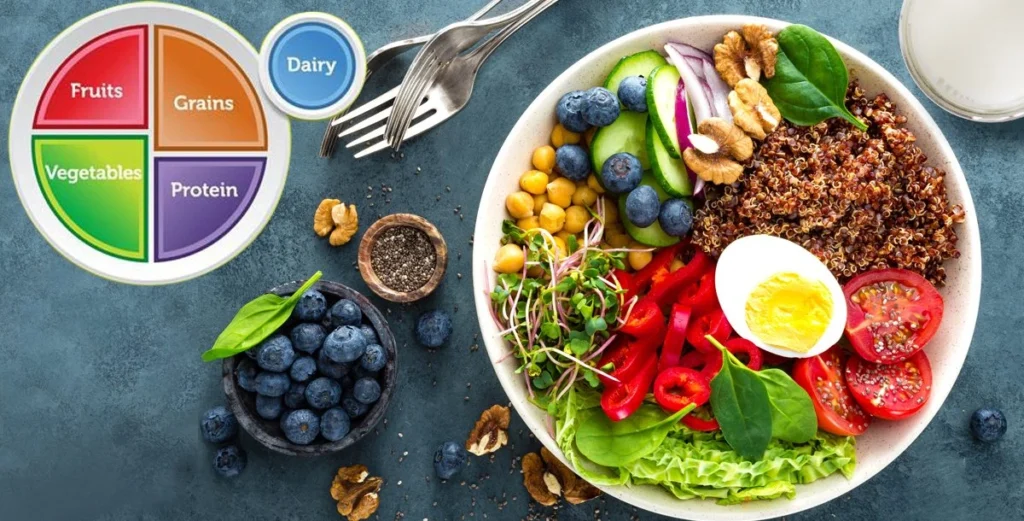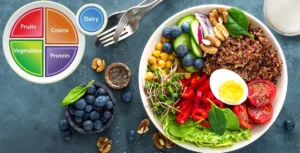Healthy Food Lifestyle
Healthy food lifestyle In today’s busy world, healthy food choices have never played such an integral role. Eating healthy is never about diets and short-term changes; rather, it’s establishing healthy, consistent habits for food intake that nurture and build up your body and contribute to overall wellness. Incorporating various nutrient-dense foods in daily life may have enduring health benefits, improve vitality, and reduce disease risk.
In this article, we’re going to have a closer examination of what healthy food living is, what good comes of it, and how to include healthy foods in alignment with your life.
What is a healthy food lifestyle?
A healthy food lifestyle is a diet in which nutrient-dense, whole foods provide vitamins, minerals, and macronutrients to sustain optimal function in the body. Balance, variety, and moderation define healthy food, as does restricting intake of excessively processed and unhealthy foods. As compared to extreme fad diets, healthy food is a methodology for healthy eating habits in lieu of extreme, short-term modifications.
Key Components of a Balanced Food Lifestyle
Whole Foods:
Eat foods in their natural, unprocessed state, including fruit, vegetables, grains, lean protein, and healthy fat. These foods provide necessary nutrients and maintain energy for longer.
Variety:
Eating foods in various varieties assures that you receive all vitamins and minerals. Incorporate plenty of colorful fruit and vegetable varieties to intake various nutrients and antioxidants.
Moderation:
A healthy diet is never denial; it’s moderateness. As crucial as keeping processed foods in check is, occasional treating yourself is okay. The goal is to keep healthy foods and goodies in healthy proportions.
Hydration:
Staying hydrated is imperative to any healthy life. Water is necessary for good digestion, maintaining energy, and healthy skin. Make sure to have eight 8-ounce glasses of water per day.
Mindful Eating:
Being attuned to how, when, and why you eat strengthens your food relationship. Mindful eating ensures that you notice your hunger and fullness cues and do not eat excessively.
Meal Planning and Prep:
Having planned ahead for meals, you’re better able to eat healthy and avoid giving in to fast food and unhealthy snack foods. Cooking and preparing food ahead in your own household means having more control over ingredients and quantity.
Benefits of Having a Healthy Food Lifestyle
Improved Physical Health:
Nutrient-dense foods provide for a robust immune system, a healthy cardiovascular system, and good digestion. The ideal food life reduces the risk of diseases such as diabetes, cardiovascular disease, and obesity.
Increased Energy:
As you fuel your body with optimal nutrients, you have increased energy and better focus. Balanced nutrition stabilizes sugars in the blood, keeping them consistent and preventing crashes.
Weight Management:
Portion control and nutrient-dense foods can help in weight management. The healthy food habit leads to healthy weight maintenance in the long term.
Better mood and mental wellbeing:
Research has shown diet to influence mental health. The intake of foods including fruit, vegetables, lean protein, and healthy fat reduces the risk of having depression, anxiety, and stress.
Clearer Skin:
The foods to eat, and in quantity, are what give rise to healthy skin, thanks to vitamins and antioxidants, which stimulate skin regrowth and alleviate inflammation. Foods loaded with vitamins A, C, and E might result in radiant, clear skin.
Longevity:
Eating healthy leads to living longer and healthier. Research is indicating that healthy food living leads to fewer health complications and better quality of life in old age.
Tips for Adopting a Healthy Food Lifestyle
Start Slowly:
You do not have to alter your diet in total in one day. Begin by including one or two healthy foods or healthy snack foods in your diet and gradually increase.
Cook at Home:
Cooking food at home offers you complete command over ingredients and quantity. You have flexibility to adopt healthy recipes and prepare food according to your personal choice while keeping them healthy.
Read Labels:
In food purchasing, read food labels for sugars, unhealthy fats, and artificial ingredients. Select foods whose ingredient lists are short and recognizable.
Choose Whole Grains:
Substitute refined grains (such as white bread and noodles) for whole grains (such as brown rice, quinoa, and whole grain bread). Whole grains have more nutrients and fiber.
Snack Smart:
Choose healthy foods to snack on, such as fruit, nuts, yogurt, or vegetables and hummus, instead of chips or cookies. These options will satisfy and energize you between meals.
Prioritize Plant-Based Foods:
You can have meat in your healthy diet, but have plant foods in larger amounts in your diet. Beans, lentils, tofu, and vegetables contain protein, fiber, and healthy fat.
Balance Your Plate:
Eat mixed, balanced food. Ensure to fill up half of your plate with vegetables, quarter fill up on lean protein, and quarter fill up on whole grains for a healthy, filling meal.
FAQs
1. What is healthy to eat for breakfast?
A healthy breakfast may include a grain, protein, and healthy fat. Such options may include oatmeal and nuts and fruit, scrambled eggs and spinach, or whole-grain toast and avocado and a poached egg.
2. Can I eat foods I love on a healthy food lifestyle?
Yes! A healthy food life is never giving up. You do have foods you love, but do them in moderation and combine them with better foods.
3. How do I keep healthy food convenient on a busy schedule?
Meal prepping is a great way to have healthy food available, whether or not the week is hectic. Prep food in advance, keep healthy snack foods on hand, and have healthy, quick foods such as smoothies or salads in the lineup.
4. How do I keep myself motivated to have a healthy food life?
Focus on the good changes you’re accomplishing and not on perfection. Keep a food diary, have small, realistic goals, and celebrate where you’re getting to. Don’t forget, it’s building habits for life, not for short-term cures.
5. Are there foods to be avoided?
Highly processed foods, foods and liquids with artificial ingredients, excessive alcoholic drinks, and foods to limit. Substitute them instead by foods that offer nutrients to your body and maintain energy.
6. Can healthy food habits help in weight loss?
Yes! A healthy and nutrient-rich diet is good for healthy weight maintenance. Couple it with regular physical activity, and you’re on your way to healthy weight maintenance and achievement.
7. Is supplement intake on an optimal food diet necessary?
In most contexts, if you eat healthy and diverse food, no supplement is necessary. In special populations (pregnant women, for example, or elderly individuals), special supplements may, however, be required. Consultation with a health professional is always recommended.
Conclusion
A healthy food lifestyle is found through intentional, balanced food choices that satisfy and nurture your body and contribute to overall wellness. Eat for physical and mental health, weight, and vitality by focusing on whole foods, variety, and moderation. Be reminded, though, that consistency, and not perfection, is what creates successful, enduring habits. Make small, healthy changes and slowly build habits to set yourself up for health for life.



